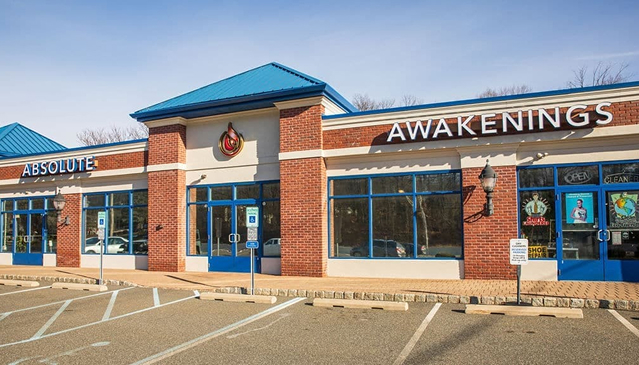Short Term Treatment Centers
Are you struggling with addiction but are afraid to go to treatment for fear of how long you will have to stay? Well, you don’t always have to commit to a long, overwhelming process. Short-term treatment centers offer focused, compassionate care designed to help you regain strength and balance, physically, mentally, and emotionally, in just a few weeks.
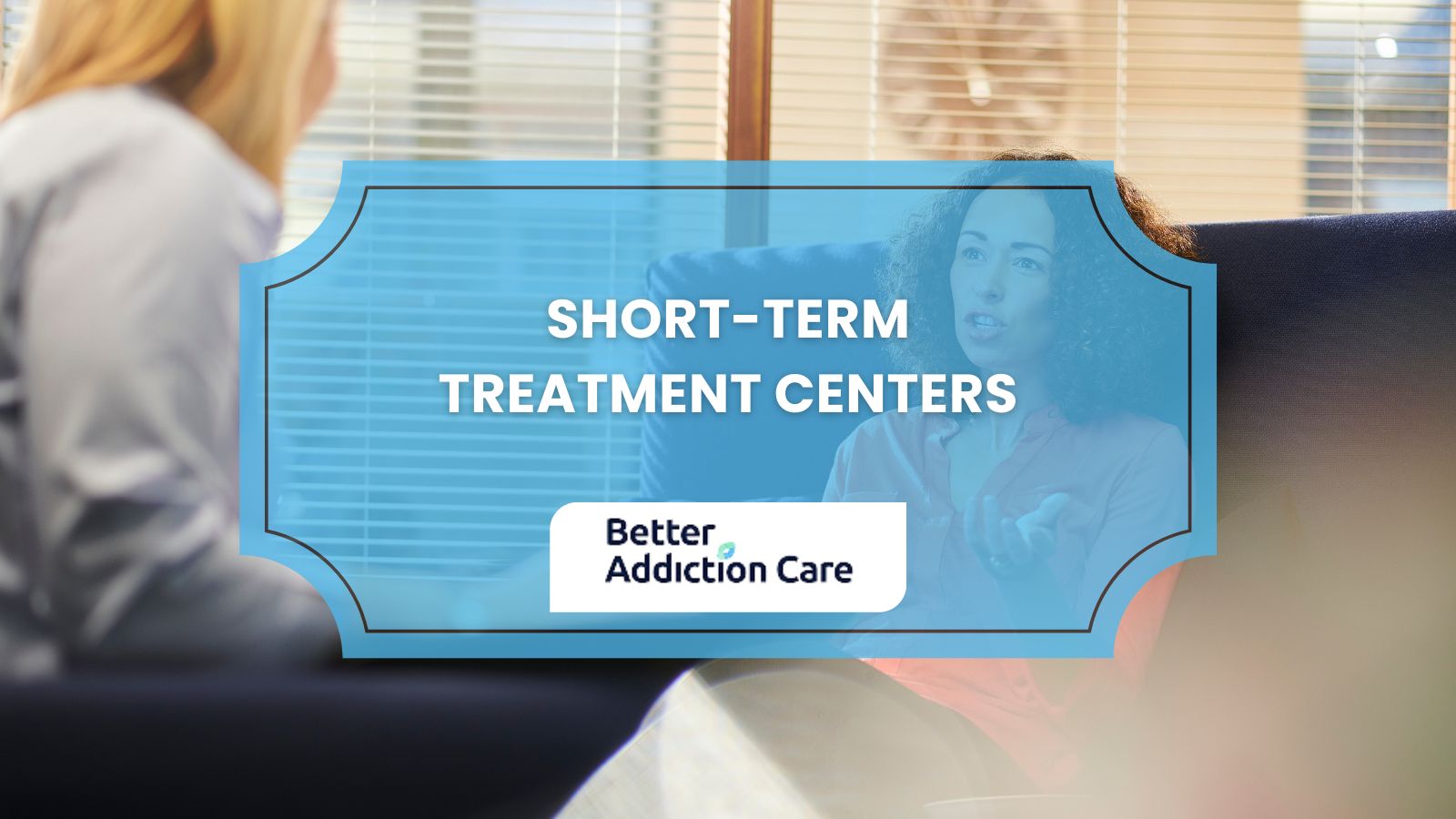
Short-term inpatient rehab typically lasts 28 to 30 days, offering intensive, structured care for early recover,y according to the Substance Abuse and Mental Health Services Administration in 2020. If you are ready to take the first step toward recovery, these programs provide real support and noticeable progress in a shorter time.
What Are Short-Term Treatment Addiction Treatment Centers?
Short-term treatment centers are specialized facilities that provide structured care for a limited time, usually about 28 to 30 days. They are designed to support people recovering from medical procedures or those seeking help with substance use challenges. These centers offer 24/7 monitoring and a variety of therapeutic services in a caring, supportive environment to help you heal safely and effectively. Medically managed detoxification is most successful when immediately followed by structured treatment, rather than used alone, according to SAMHSA TIP 45, 2020.
The purpose of short-term rehab is to provide focused support during a critical phase of recovery. Whether you’re regaining physical health after detox or beginning your journey to overcome addiction with therapy, these programs help you build a strong foundation for lasting wellness, quickly and compassionately.
What are the Types of Short-Term Treatment Programs?
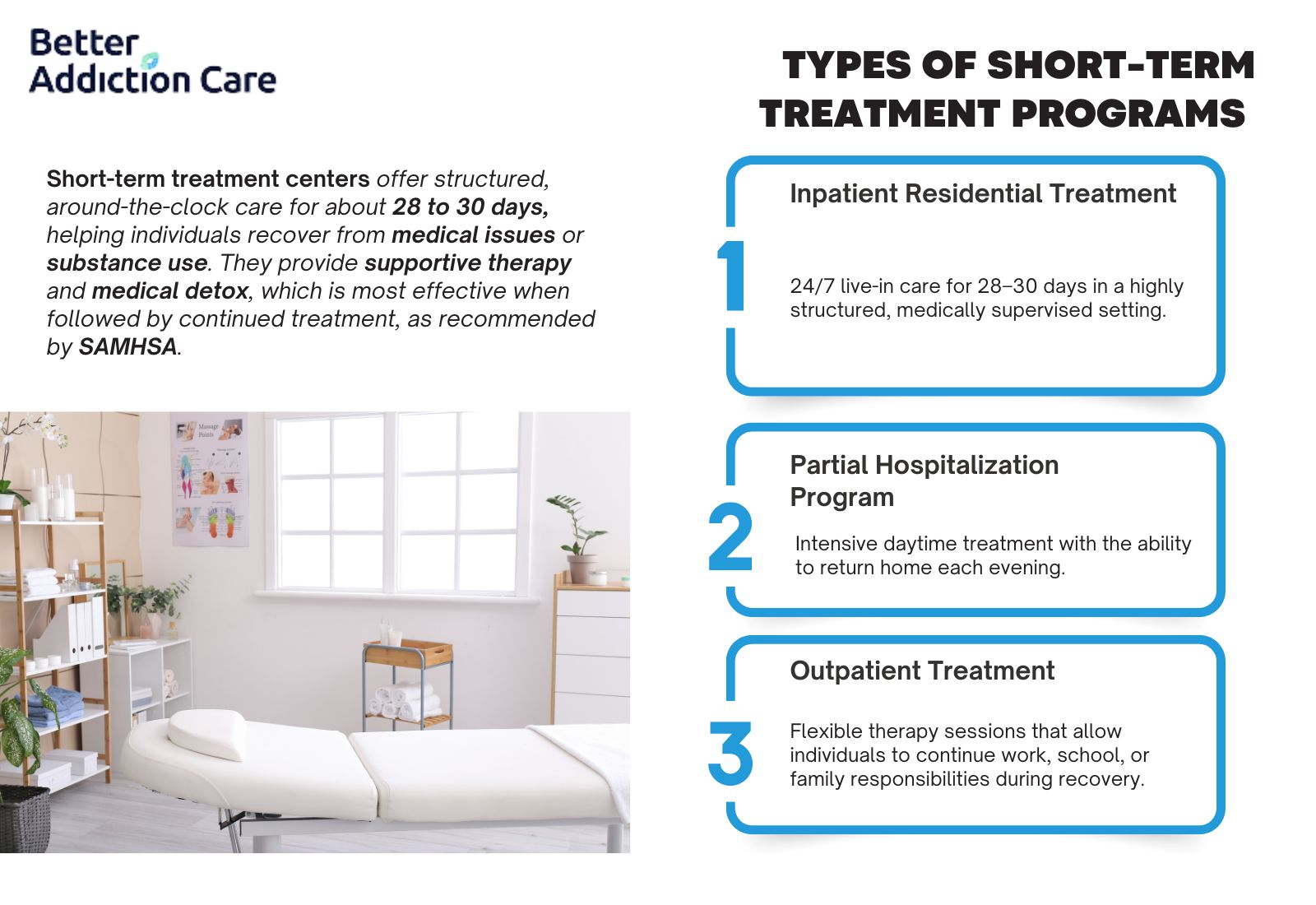
The types of short-term treatment programs include inpatient residential treatment, Partial Hospitalization Programs (PHP), and outpatient treatment. Each option offers different levels of care and flexibility to fit your unique needs. Whether you need round-the-clock support or a program that allows you to stay connected to daily life, these programs are designed to help you make meaningful progress in a shorter time frame.
The types of short-term treatment programs include:
Inpatient residential treatment:
This program provides 24/7 care in a structured, supportive setting where you live at the facility for 28 to 30 days. It’s ideal for those needing intensive support and close medical supervision during recovery.
Partial Hospitalization Program (PHP):
PHP offers a step-down level of care where you spend several hours a day at the treatment center but return home or to a supportive environment in the evenings. Partial Hospitalization Programs or Partial Care Programs are a great option for those who need strong support but don’t require overnight care.
Outpatient treatment:
Outpatient programs provide flexible therapy and counseling sessions while allowing you to continue with daily responsibilities like work or school. Outpatient treatment options suit individuals with mild to moderate needs who want to maintain normal routines during recovery.
What Treatments and Therapies Are Offered at Short-Term Treatment Centers?
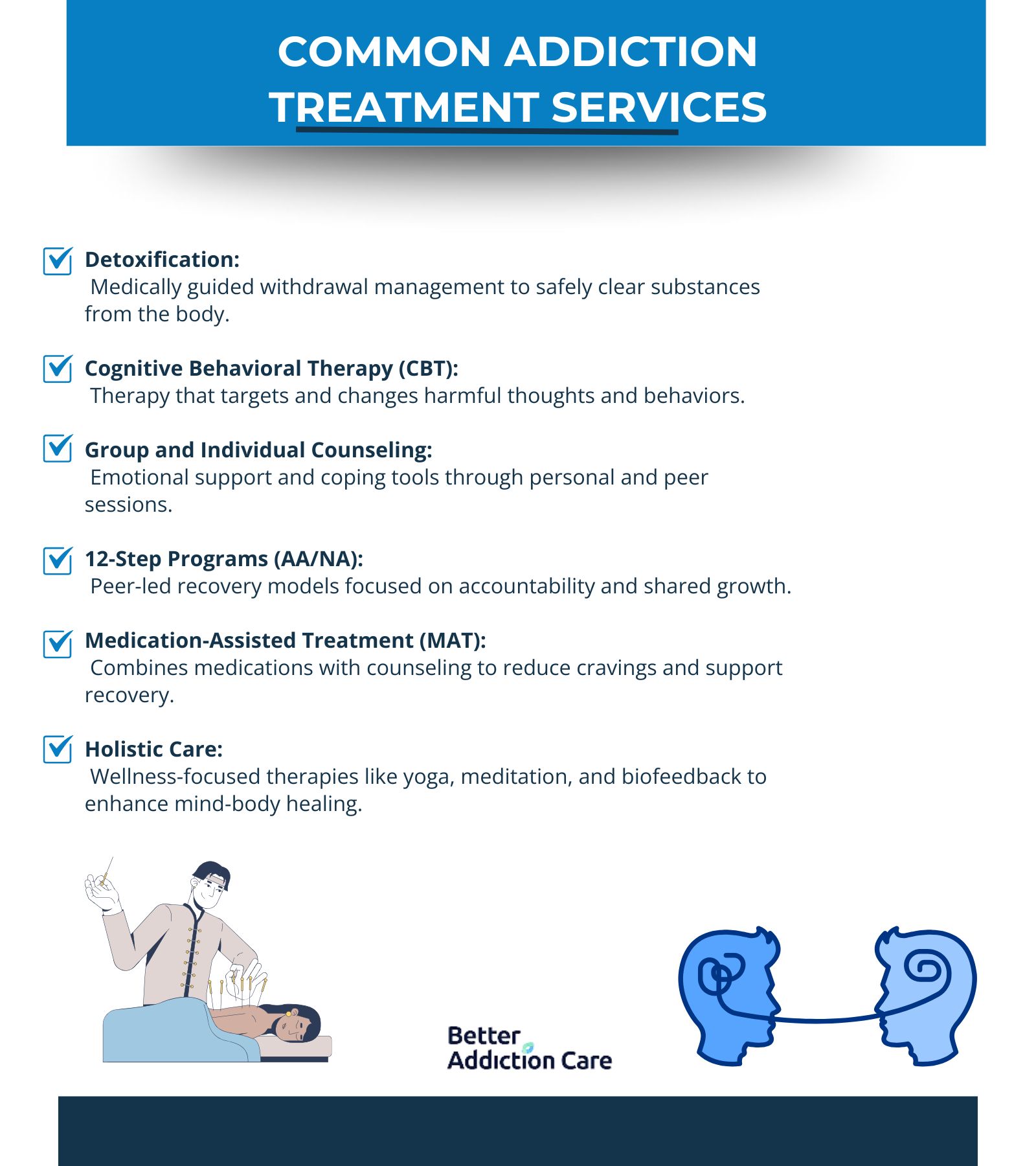
Treatments and therapies offered at short-term treatment centers include detoxification, cognitive behavioral therapy (CBT), group and individual counseling, 12-step programs like AA and NA, medication-assisted treatment (MAT), and holistic care options such as yoga and meditation. They offer a range of services and therapies designed to support your physical, mental, and emotional recovery in a focused time frame. These programs combine medical care with evidence-based therapies and holistic approaches to help you build lasting skills for wellness.
Common services include:
-
Detoxification: A medically supervised process to safely manage withdrawal symptoms and clear substances from your body, preparing you for further treatment.
-
Cognitive Behavioral Therapy (CBT): A focused therapy that helps you identify and change negative thought patterns and behaviors to support long-term recovery.
-
Group and individual counseling: Personalized and group sessions that provide emotional support, coping strategies, and a safe space to share your experiences.
-
12-step programs (AA/NA): Structured peer support programs that encourage accountability, connection, and ongoing recovery through shared experiences.
-
Medication-Assisted Treatment (MAT): The use of FDA-approved medications combined with counseling to reduce cravings and manage withdrawal symptoms effectively.
-
Holistic care (yoga, meditation, biofeedback): Complementary therapies aimed at improving overall well-being, reducing stress, and promoting mental and physical balance.
Who Benefits from Short-Term Treatment Programs?
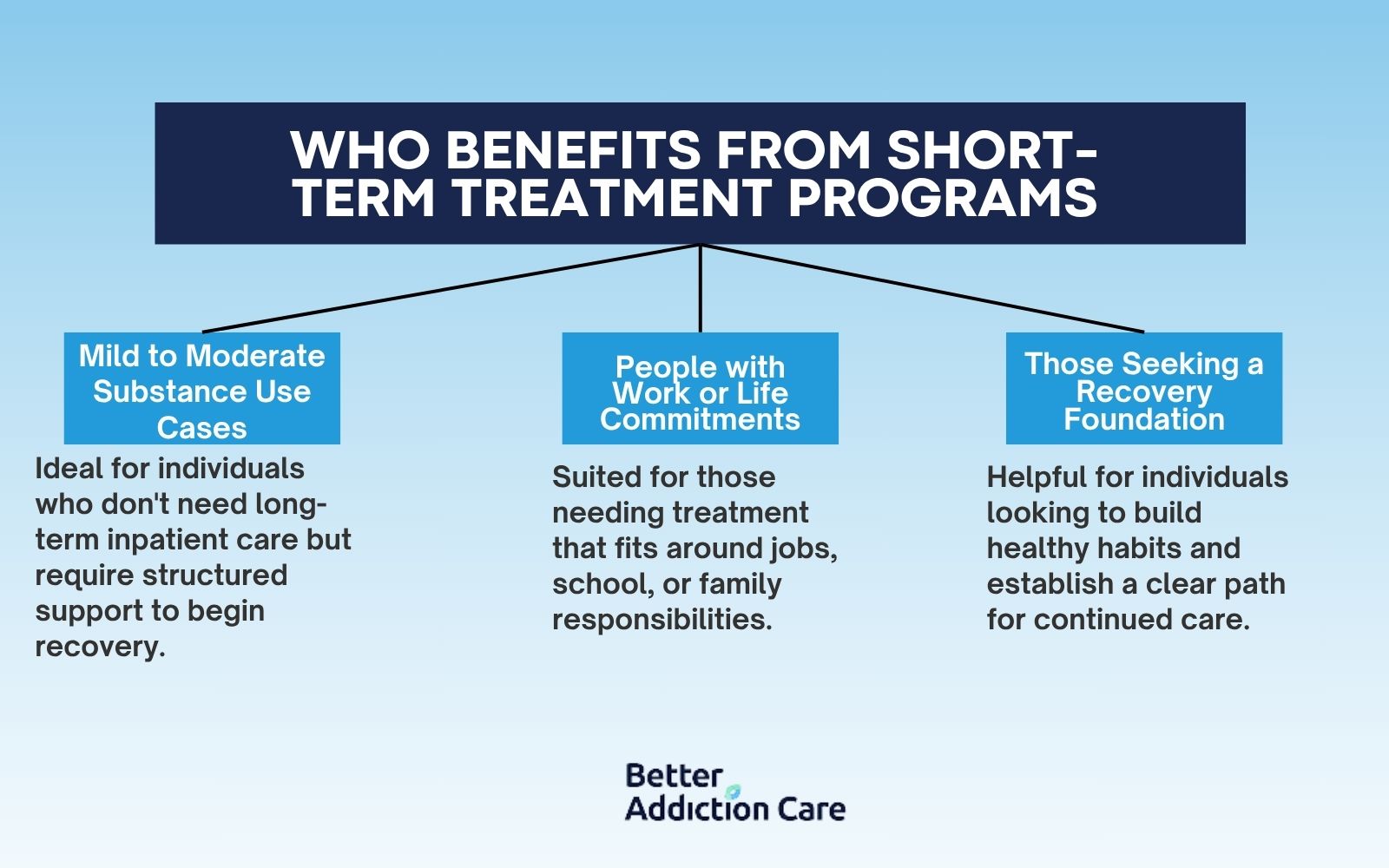
Individuals who benefit from short-term treatment programs are people seeking recovery or medical support in a shorter time frame. They offer focused care that meets different needs, whether you’re balancing work and life or just starting your journey toward healing.
Here are some individuals who benefit from short-term treatment:
-
Individuals with mild to moderate substance use disorders: Those whose addiction doesn’t require long-term inpatient care but still need structured support to safely begin recovery.
-
People with time or work constraints preventing long-term care: Those who need flexible treatment options that allow them to maintain daily responsibilities while getting help.
-
Those needing a structured entry into recovery: Individuals who want a strong foundation and immediate support to build healthy habits and plan for ongoing care.
What Is the Typical Stay at Short-Term Treatment Centers?
Typical stays at short-term treatment centers usually range from 7 to 30 days, depending on individual needs and program options. Some programs offer shorter detox or jump-start options lasting 3, 5, 7, 10, or 14 days, while others provide a more structured 28- or 30-day rehab experience. After completing a short-term program, continued care or follow-up support is recommended to help maintain progress and long-term recovery.
What Happens After Completing Short-Term Treatment Programs?
After completing a short-term treatment program, continuing recovery becomes the focus to help maintain the progress made during your stay. Support services such as outpatient counseling, support groups, and ongoing therapy are recommended to provide guidance and encouragement as you navigate life beyond treatment. These resources help build a strong, lasting foundation for long-term wellness and prevent relapse.
What are the Pros and Cons of Short-Term Treatment Programs?
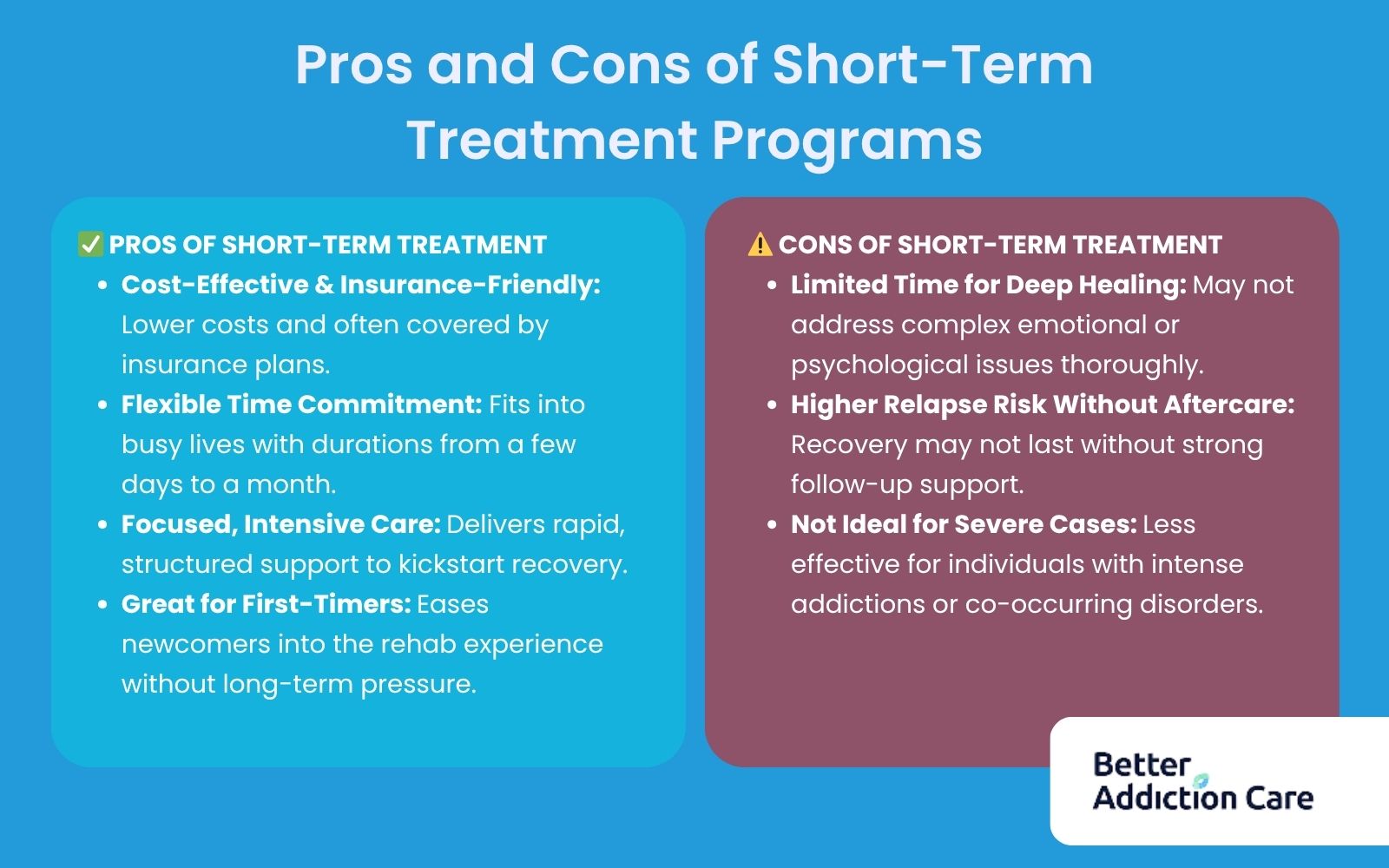
The pros and cons of short-term treatment programs depend on your personal needs and goals. On the plus side, short-term programs offer focused, intensive care that fits into a busy schedule and costs less than longer stays. However, because of their shorter duration, some people find they need additional follow-up care or support afterward to maintain progress. For those with more severe issues, a longer program is necessary to fully address their needs. Short-term rehab facilities (rehab/residential, short-term) have a higher rate of public funding (58.0%) than the national average for all facility types, according to SAMHSA.
Here are the pros and cons of short-term treatment programs:
Pros of Short-Term Treatment:
-
Affordable and widely covered by insurance: Short-term programs cost less than long-term options and are frequently covered by many insurance plans, making them more accessible.
-
Lower time commitment: With stays ranging from a few days to a month, these programs fit better into busy schedules and life responsibilities.
-
Intense, focused therapy: The condensed format offers concentrated support and therapies designed to jump-start recovery quickly and effectively.
-
Ideal for first-time treatment seekers: Short-term programs provide a manageable introduction to treatment for those new to recovery or medical rehab.
Cons of Short-Term Treatment:
-
May not provide enough time for deep-rooted issues: Short stays might not allow enough time to fully address underlying emotional or psychological challenges.
-
Risk of relapse without strong aftercare: Without proper follow-up support, the chances of returning to old habits increase after completing short-term treatment.
-
Less effective for severe addictions or complex conditions: Those with more serious or complicated issues require longer, more intensive programs for lasting recovery.
What Is the Cost of Short-Term Treatment?
The cost of short-term treatment ranges from $5,000 to $20,000 for a 30-day stay, while outpatient treatment usually comes at a lower cost. It varies widely depending on the type and level of care.
The average cost of a 30-day residential program is about $12,500, though costs can range widely by facility and location, according to the National Institute on Drug Abuse in 2020. Many medical rehab services are covered partially or fully by private insurance plans, making treatment more affordable for those who qualify. It’s always a good idea to check with your provider and insurance company to understand your options and coverage.
Is Short-Term Rehab Effective?
Yes, short-term rehab is very effective, especially for individuals with mild to moderate substance use issues or those seeking a focused, intensive start to their recovery. It provides the essential tools, support, and medical care needed to begin healing quickly. However, its success depends on continued aftercare and follow-up support to maintain progress over the long term.
Will Insurance Cover Short-term Treatment?
Yes, many insurance plans do cover short-term treatment, especially when it’s medically necessary. Coverage varies depending on your provider and policy, but programs like inpatient rehab, outpatient therapy, and detoxification are included. You must check with your insurance company beforehand to understand what’s covered and any out-of-pocket costs you have. You are also able to verify your insurance with online resources like Better Addiction Care.
Related Articles
Treatment Centers in New Jersey







